Devender Singh | |
|---|---|
 Devender Singh | |
| Born | 6 November 1947 |
| Nationality | Indian |
| Known for | Painting |
| Website | www |
Devender Singh (born 6 November 1947) is a contemporary Indian artist (painter) from Punjab.
Devender Singh | |
|---|---|
 Devender Singh | |
| Born | 6 November 1947 |
| Nationality | Indian |
| Known for | Painting |
| Website | www |
Devender Singh (born 6 November 1947) is a contemporary Indian artist (painter) from Punjab.
Singh was born on 6 November 1947 [1] in Amritsar, Punjab. His father, Sewak Singh (G.D. Art Lahore), was a well-known artist himself.
He received his formal education at Mumbai, Ludhiana and Chandigarh. [2]
His well-known paintings include the series made on Bara Maha. Singh started his career with illustrations made for the very famous Amar Chitra Katha comics. His Sikh historical paintings are well known among Punjabis throughout the world.
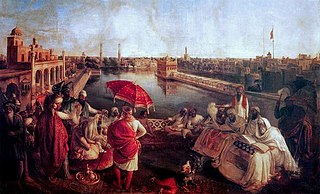
Sikhs are people who adhere to Sikhism (Sikhi), a monotheistic religion that originated in the late 15th century in the Punjab region of the Indian subcontinent, based on the revelation of Guru Nanak. The term Sikh has its origin in the word śiṣya (शिष्य), meaning 'disciple' or 'student'.

The Khalistan movement is a Sikh separatist movement seeking to create a homeland for Sikhs by establishing a sovereign state, called Khālistān, in the Punjab region. The territorial claims of Khalistan includes the existing Indian states of Punjab, Chandigarh, Haryana, Himachal Pradesh, Delhi and some other regions of the states of Rajasthan, Uttar Pradesh and Uttarakhand etc. Khalistani separatists declared their unilateral independence from India on 29 April 1986. In 1993, Khalistan was briefly admitted in the UNPO. The Khalistan movement was at its peak in the 1980s and 1990s, later the Indian government suppressed the movement till 1995.

Amritsar, historically also known as Rāmdāspur and colloquially as Ambarsar, is the second largest city in the Indian state of Punjab, after Ludhiana. It is a major cultural, transportation and economic centre located in the Majha region of Punjab. The city is the administrative headquarters of the Amritsar district.

Panth Rattan Shiri Gurcharan Singh Tohra was a president of Shiromani Gurdwara Parbandhak Committee (SGPC), a Sikh body in charge of controlling Gurdwara. He died of a heart attack in New Delhi on 1 April 2004 at the age of 79. He remained the head of the SGPC for a record 27 years, and was one of the most influential and controversial Sikh leaders of the 20th century.
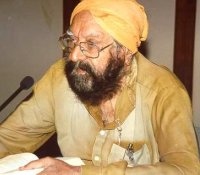
Khushwant Singh was an Indian author, lawyer, diplomat, journalist and politician. His experience in the 1947 Partition of India inspired him to write Train to Pakistan in 1956, which became his most well-known novel.
Satwant Singh was one of the bodyguards, along with Beant Singh, who assassinated the Prime Minister of India, Indira Gandhi, at her New Delhi residence on 31 October 1984.

Khalistan Liberation Force (KLF) is a militant group, and is part of the Khalistan movement to create a Sikh homeland called Khalistan via armed struggle. The KLF appears to have been a loose association of scattered Khalistani groups.

Sikhism in Pakistan has an extensive heritage and history, although Sikhs form a small community in Pakistan today. Most Sikhs live in the province of Punjab, a part of the larger Punjab region where the religion originated in the Middle Ages, with some also residing in Peshawar in the Khyber-Pakhtunkhwa province. Nankana Sahib, the birthplace of Guru Nanak Sahib Ji, the founder of Sikhism, is located in Pakistan's Punjab province. Moreover, the place where Guru Nanak Dev died, the Gurudwara Kartarpur Sahib is also located in the same province.
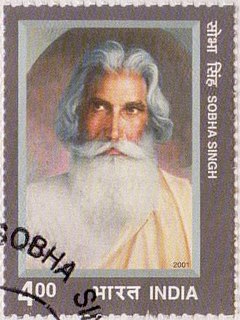
Sobha Singh was an artist from Punjab, India.
Harjinder Singh Jinda was a member of the Sikh separatist group Khalistan Commando Force and one of the two assassins of Arun Vaidya. He was responsible for three high-profile assassinations; Arjan Dass, Lalit Maken and Gen. Vaidya. He along with other members of Khalistan Commando Force participated in Indian history's biggest bank robbery of Rs. 57.0 million from Punjab National Bank, Miller Gunj branch, Ludhiana to finance the campaign for a separate Sikh state of Khalistan.
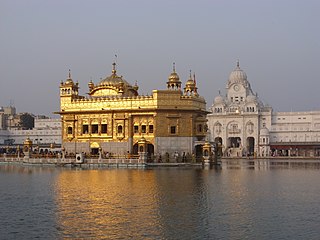
Sikhism is the fourth largest religion in India contributing 1.7% of the population and has existed since the late 15th century. The Sikhs are predominantly located in Punjab State, but are also present in many other parts of India. It is the fifth largest organised religion in the world after Christianity, Islam, Hinduism and Buddhism, and the fourth largest in India with 25-30 million adherents worldwide. These adherents were also known as Khalsa Sikhs.
The Sikhs are adherents to Sikhism the fifth largest organized religion in the world, with around 25 million adherents. Sikh History is around 500 years and in that time the Sikhs have developed unique expressions of art and culture which are influenced by their faith and synthesize traditions from many other cultures depending on the locality of the adherents of the religion. Sikhism is the only religion that originated in the Punjab region with all other religions coming from outside Punjab. All the Sikh gurus, many saints and many of the martyrs in Sikh history were from Punjab and from the Punjabi people. Punjabi culture and Sikhism are mistakenly considered inseparably intertwined. "Sikh" properly refers to adherents of Sikhism as a religion, strictly not an ethnic group. However, because Sikhism has seldom sought converts, most Sikhs share strong ethno-religious ties as therefore it's a common stereotype that all Sikhs share the same ethnicity. Many countries, such as the U.K., therefore misconcievingly recognize Sikh as a designated ethnicity on their censuses. The American non-profit organization United Sikhs has fought to have Sikh included on the U.S. census as well, arguing that Sikhs "self-identify as an 'ethnic minority'" and believe "that they are more than just a religion".

Gurmeet Ram Rahim Singh Insan, known also as MSG, is the head of the Indian social group Dera Sacha Sauda (DSS) since 1990. Prior to a 2017 rape conviction, he was a religious leader, actor, singer, writer, songwriter, director, and composer. He was also convicted of being involved in the murder of journalist Ram Chander Chhatrapati. According to The Indian Express, a prisons department official said Bharatiya Janata Party-led Haryana government had started looking for a “suitable job” for Ram Rahim two years ago before the 2017 rape conviction.
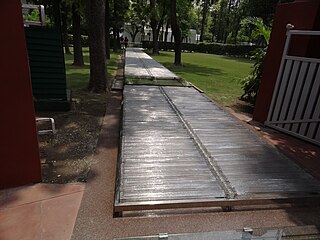
Indian Prime Minister Indira Gandhi was assassinated at 9:29 a.m. on 31 October 1984 at her residence in Safdarjung Road, New Delhi. She was killed by her bodyguards Satwant Singh and Beant Singh in the aftermath of Operation Blue Star, an Indian military action carried out between 1 and 8 June 1984 ordered by Indira Gandhi to remove Jarnail Singh Bhindranwale and his followers from the Golden Temple of Harmandir Sahib in Amritsar, Punjab. The collateral damage included the death of many pilgrims, as well as damage to the Akal Takht. The military action on the sacred temple was criticized both inside and outside India.
Sukhdev Singh Dhillon, best known as Labh Singh and also known as Sukha Sipahi and General Labh Singh, was a former Punjab police officer turned militant who took command of the Khalistan Commando Force after its first leader, Manbir Singh Chaheru, was arrested in 1986.
According to the 2011 Census of India, Punjab, India has a population of around 27.7 million.

S. G. Thakur Singh (1899–1976) was an Indian artist who painted in oils, pastels and water colour

Punjab is a state in northern India. Forming part of the larger Punjab region of the Indian subcontinent, the state is bordered by the Indian states of Himachal Pradesh to the north and northeast, Haryana to the south and southeast, and Rajasthan to the southwest; by the Indian union territories of Chandigarh to the east and Jammu and Kashmir to the north. It shares an international border with Punjab, a province of Pakistan to the west. The state covers an area of 50,362 square kilometres, which is 1.53% of India's total geographical area, making it the 19th-largest Indian state by area out of 28 Indian states. With over 27 million inhabitants, Punjab is the 16th-largest Indian state by population, comprising 23 districts. Punjabi, written in the Gurmukhi script, is the most widely spoken and the official language of the state. The main ethnic groups are the Punjabis, with Sikhs and Hindus as the dominant religious groups. The state capital is Chandigarh, a union territory and also the capital of the neighbouring state of Haryana. The five tributary rivers of the Indus River from which the region takes its name are the Sutlej, the Beas, the Ravi, the Chenab and the Jhelum. Of these, the first three flow through Indian Punjab, while the latter two flow entirely through Punjab, Pakistan.

The Haveli Todar Mal popularly known as Jahaz Haveli or Jahaz Mahal is the 17th century residence (haveli) of Todar Mal, who became the diwan in the court of Nawab Wazir Khan, the Governor of Sirhind, under Mughal Empire. Today, it is remembered for the cremation of young martyred sons of Guru Gobind Singh and his mother.

Parkash Singh Badal is an Indian politician who was Chief Minister of Punjab state from 1970 to 1971, from 1977 to 1980, from 1997 to 2002, and from 2007 to 2017. He is also the patron of Shiromani Akali Dal (SAD), a Sikh-centered regional political party. He was the president of the party from 1995 to 2008, when he was replaced by his son Sukhbir Singh Badal. As the patron of SAD he exercises a strong influence on the Shiromani Gurdwara Parbandhak Committee and Delhi Sikh Gurdwara Management Committee. The Government of India awarded him the second-highest civilian award, Padma Vibhushan, in 2015.